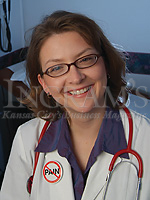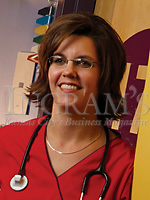Suzie Draper Baptist-Lutheran Medical Center

Ask Suzie Draper about her vacation and her answer might surprise you.
For the past six years, Draper, a registered nurse in the operating room at Baptist-Lutheran Medical Center, has spent one of her vacation weeks volunteering her nursing skills in the Dominican Republic. She travels with a group of healthcare professionals providing free surgical services to people in unsanitary, economically challenged areas of the Caribbean country. Draper has given of her time to help perform surgical work in Romania as well.
Draper characterized the services offered through the volunteer healthcare groups as “small surgeries” such as hernias. Year after year, upon returning from trips abroad, Draper appreciates anew the quality of healthcare available to most people in the United States. She laments, however, that it would benearly impossible to provide such free surgical services in the U.S., if only because of the litigious nature of our society.
A thirty-year nursing veteran, Draper—when not off applying her nursing expertise in some foreign land—enjoys working with the kidney patients who make use of the nephrology clinic she help start with Dr. Tim Neufeld. Wherever she is, Draper says, her mandate as a healthcare professional is the same: Do no harm.
Jennifer Surprise University of Kansas Medical Center

Through her job, Jennifer Surprise has come to understand that there is more than one kind of pain. But it all hurts.
As an advance practice nurse at the Persistent Pain Management Clinic at the University of Kansas Medical Center, Surprise fully expects to help patients manage their physical pain. That so much of the treatment involves addressing the depression that can accompany persistent pain still amazes her.
Quite often, says Surprise, patients with chronic pain arrive at the clinic “after they’ve had every other kind of pain treatment. They've seen multiple doctors, all these specialists. They’ve been passed around the hospital and been told 'There's not much else we can do for you.’”
A large part of Surprise’s job involves establishing trust with patients and their families. The process begins by treating the immediate physical pain even as Surprise works up full histories to help determine the source of the physical pain. Surprise also watches for the depression and anxiety that persistent pain so often brings on.
“Psychology is a huge part of it,” says Surprise. “Long-term pain can cause other medical problems; it can strain finances because maybe the patient can’t work. And it can cause personal problems with loved ones who have to take care of the patient at home.”
Ultimately, that trust is its own reward, says Surprise. “The relationships we have with persistent pain patients are deeper than I think you get as a clinical nurse. You spend more time with patients. They talk about their families. You get to know them and help them.”
Lori Weishaar Lakeside Pediatrics

With pediatric experience spanning almost two decades, registered nurse Lori Weishaar thoroughly understands who her patients are. More often than not, Weishaar says, she is “working with two patients—the child and the parent.”
Keeping that in mind when she works what she calls “phone triage,” Weishaar says she gives credenceto every call from concerned parents.
“Even if it’s a situation I’m not concerned about but the parent is uncomfortable, I give them the benefit of the doubt and get them an appointment,” says Weishaar.
As expected, Weishaar admits to having always enjoyed working and playing with children. As the lead office nurse at the 15-person Lakeside Pediatrics in St. Joseph, an important component of Heartland Health, Weishaar deals with everything from runny noses to kids with cancer to kids living with chronic heart conditions.
No matter the circumstances, says Weishaar, the job always is to keep the best interests of the child at the forefront of everything she does. Children recognize that, she says, adding that the job is at its most rewarding when young patients that are in for a visit will seek her out just to say hello before they go home.
“You get to watch all these kids grow up,” says Weishaar. “It’s like a second family.”
